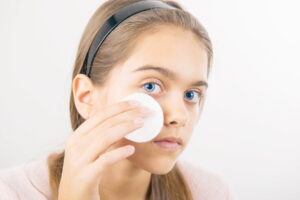Skin Care and Teenagers
 Every parent expects their sweet babies will one day grow into hormonal teenagers, with changes in their appearance and their attitude. Some dread this change, but it’s none other than teens themselves who have to deal with their bodies changing, smelling differently, and deal with skin care and acne!
Every parent expects their sweet babies will one day grow into hormonal teenagers, with changes in their appearance and their attitude. Some dread this change, but it’s none other than teens themselves who have to deal with their bodies changing, smelling differently, and deal with skin care and acne!
What Happens to the Skin?
In a single word: hormones. Puberty begins around age 9 or 10, when the hypothalamus releases a gonadotropin-releasing hormone (GnRH). This hormone travels to the pituitary gland, which is a small gland under the brain that produces hormones which control other hormones in the body. When GnHR reaches the pituitary gland luteinizing hormone (LH) and follicle-stimulating hormone (FSH) are released. These two are responsible for the development of the reproductive system. At the same time, the adrenal glands produce adrenal androgens, which cause body hair growth. But the biggest concern is the skin glands, which produce the natural oil sebum. Puberty hormones increase the amount of sebum, which clogs the pores and causes skin care and acne problems.
Proper Skin Care
The first way to deal with acne is natural methods. It’s important to keep the skin clean by washing gently, and regularly, with warm water and a mild soap. Pat dry with clean tissues to reduce the risk of oil transfer between uses. It’s also important keep your hair away from your face for the same reason: oil transfer. With changing hormones, you may notice your body odor becoming stronger. Regular showers are necessary now more than ever, as bathing ensures your hair is kept clean. Fresh pillowcases can also work wonders!
There are numerous over the counter skin care products you can use when washing your face, and it’s a good idea to exfoliate at least once a week. For persistent pimples, you can try drying them out using some isopropyl alcohol on a cotton round. Cleaning your face with a cotton round dipped in alcohol, or using alcohol wipes, is also a great way to dry out some of the excess oil and help your pores unclog.
Dermatological Methods for Skin Care
Some cases of acne may be more serious, and in need of a dermatologist’s assistance. The first mild, topical, medication a doctor may suggest is retinoid drugs gel or lotion form which is to be applied in the evening and prevents clogging of hair follicles. Azelaic acid is another option, a naturally occurring acid produced by a yeast. It has antibacterial properties and has been known for its effectiveness. Salicylic acid is another option, but studies show it’s not as effective. Inflammation and excess skin bacteria can be treated with some mild antibiotics, often used with benzoyl peroxide to reduce the risk of antibiotic resistance.
If acne persists after topical medications, it may be time for oral medications. These are the highest tier of acne treatment, but if you have any concerns about these changes and this process, it is highly recommended you reach out to a medical professional.
More
